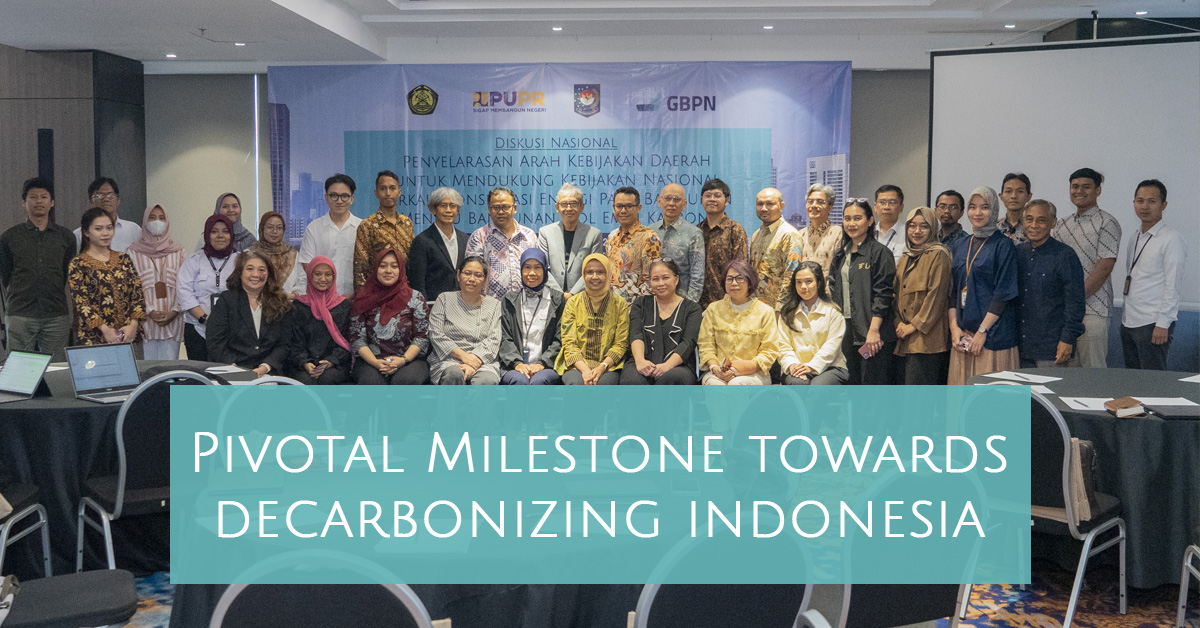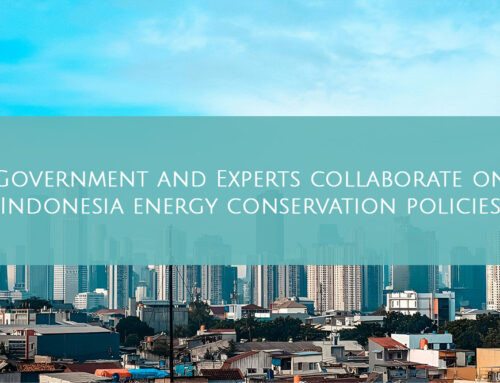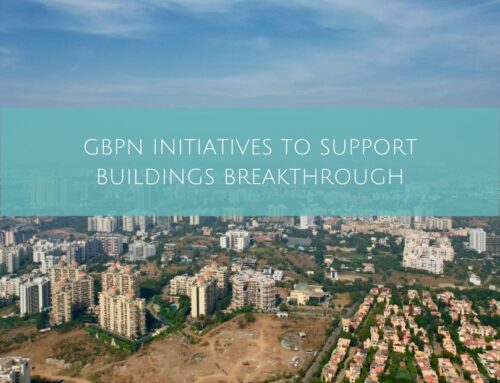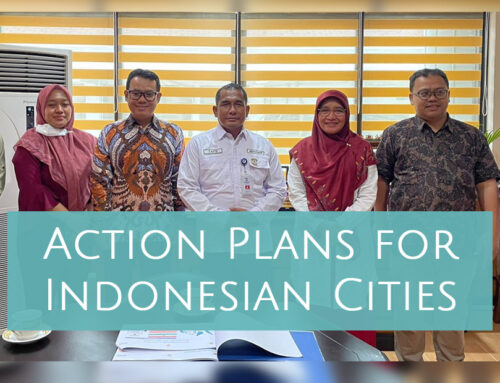A major research project spanning 11 cities in Indonesia marks a significant leap forward in decarbonizing the country’s buildings sector. Running over 18 months, the GBPN-led project collected valuable insights on how to effectively tailor energy efficiency solutions to local regions, laying the groundwork for a nationwide blueprint. The project culminated in a high level discussion event that brought together some of the most influential government Ministries and experts in the county.
GBPN’s Indonesia Country Manager, Dr Ery Wijaya, said the event was a pivotal moment in Indonesia’s journey towards net zero.
 “The high level representation at this event showed the serious commitment Indonesia has to improving energy efficiency in its buildings sector. Stakeholders from the Ministry of Energy and Mineral Resources (MEMR), Ministry of Public Works and Housing (PUPR), Ministry of Home Affairs (MoHA), academia, and industry convened to chart a course towards transformative policy reforms,” Dr Wijaya said.
“The high level representation at this event showed the serious commitment Indonesia has to improving energy efficiency in its buildings sector. Stakeholders from the Ministry of Energy and Mineral Resources (MEMR), Ministry of Public Works and Housing (PUPR), Ministry of Home Affairs (MoHA), academia, and industry convened to chart a course towards transformative policy reforms,” Dr Wijaya said.
“Indonesia aims not only to mitigate its carbon footprint but also to foster resilience and prosperity across its urban landscape.”
Armed with valuable insights garnered from the extensive research conducted across Indonesia’s diverse urban landscapes, experts and government are now poised to translate findings into actionable plans tailored to each city’s unique context. These insights will be collated and published in the coming weeks.
“The post-project phase is marked by a concerted effort to improve energy efficiencies at the local level while simultaneously considering how these insights can be used to scale and replicate energy savings across the country,” Dr Wijaya said.
“As stakeholders gather to dissect data and learn from key findings in building the energy sector, the emphasis shifts towards collaboration and knowledge sharing.”
The partnership would also have an expanded remit to overcome alignment challenges and implement practical solutions at all levels.
“This partnership aims to shift focus from just technical solutions to integrating energy-efficient practices into broader strategies. By working closely with the Ministry of Home Affairs, Ministry of Public Works and Housing, and other key players, GBPN will support the government to lay down clear pathways to overcome barriers to implementation and spread awareness, creating local demand,” Dr Wijaya said.
“The partnership will ensure that Indonesia’s National Ministries are working in a coordinated way with regional governments. This will assist them in moving towards a more effective approach to monitoring and evaluating emissions, and integrating energy measurement into existing practices. It also provides an opportunity for sub-national governments to define their building energy conservation targets and develop clear indicators to measure their energy conservation achievements.”
Ministries and Subnational Coordination for Energy Conservation

Head of the Sub-directorate of Data and System Development from the Ministry of Public Works, Fajar Santoso Hutahaean, also highlighted how ministries will have a stronger coordination in monitoring energy conservation targets through new policies and regulations.
“We are currently in the works of coordinating closely with Ministry of Energy and Minerals when they’re ready to launch Buildings Energy Consumption Index. This index will be very useful for us in the Green Building Secretariat to set achievable energy efficiency targets in the Green Buildings Roadmap implementation.” Fajar said.
Presenting in the National Discussion, Hendro Gunawan, Deputy Director for Technical Assistance and Cooperation of Energy Conservation, Ministry of Energy and Mineral Resources, explains further on the ministry’s role in collaborating with ministries as well as local government in the subnational level.
 “Energy conservation and management coordination with local government is directly regulated from the national government. This includes getting supports, monitoring, and how it will be implemented. We have set guidelines and targets as well as trainings for buildings sector in the local goverment to manage their energy conservation effort.” Hendro said.
“Energy conservation and management coordination with local government is directly regulated from the national government. This includes getting supports, monitoring, and how it will be implemented. We have set guidelines and targets as well as trainings for buildings sector in the local goverment to manage their energy conservation effort.” Hendro said.
“From these engagement we hope that energy managers in building sector could replicate their knowledge and practice to other stakeholders in the subnational level.”
GBPN’s Indonesia Senior Manager, Yeni Indra, said the project acknowledged the significance of contextualizing policy approaches and targets and fostering implementable and replicable policy reforms nationwide.
 “This project identified a range of municipal characteristics that outline the local capacity to adopt and implement energy conservation measures within their built environment. It had strong support from 11 cities-municipalities from three major islands in Indonesia, each representing distinct municipal attributes,” Ms Indra said.
“This project identified a range of municipal characteristics that outline the local capacity to adopt and implement energy conservation measures within their built environment. It had strong support from 11 cities-municipalities from three major islands in Indonesia, each representing distinct municipal attributes,” Ms Indra said.
“The project provided comprehensive understanding on where potential energy savings are, what are the local initiatives, who are the key stakeholders, and how energy conservation and energy-efficient building adoption can evolve at the local level.”
As Indonesia’s journey towards sustainable development continues, the achievements facilitated by GBPN stand as pillars of progress.
- Establishment of a comprehensive National Database for building energy data: Provides a foundation for informed decision-making and targeted interventions
- Enhanced policy coordination between national and subnational stakeholders: Fosters a collaborative environment to deliver meaningful impact.
- Increased capacity and awareness of energy efficiency in buildings, catalyzed by GBPN & government’s efforts: Empowers communities to become agents of change in their own right.
- Implementation of a National Policy Reform Plan aimed at promoting energy efficiency in buildings: Signifies a commitment to transformative change at the highest levels of governance.
Share This Story, Choose Your Platform!
Stay in touch with how we’re transforming the buildings sector
GBPN runs innovative building policy reform programs in key regions around the world that aim to tackle the climate emergency by decarbonising the buildings sector. Stay up to date with our newsletter.
Stay in touch with how we’re transforming the buildings sector
GBPN runs innovative building policy reform programs in key regions around the world that aim to tackle the climate emergency by decarbonising the buildings sector. Stay up to date with our newsletter.







